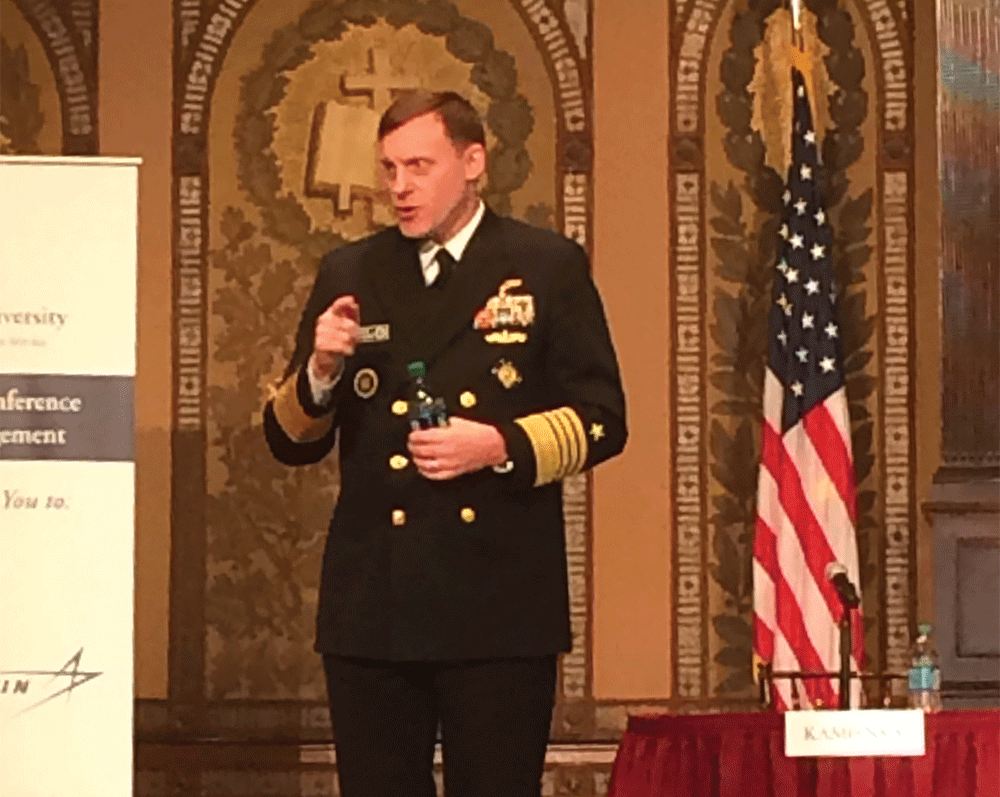
NSA Director Admiral Michael S. Rogers addressed the issues of cyberattacks in an address at the sixth annual International Conference on Cyber Engagement on Tuesday.
FBI Director James Comey and NSA Director Admiral Michael S. Rogers emphasized the growing risk of cyberattacks and the need to better respond to them in their keynote speeches at the sixth annual International Conference on Cyber Engagement in Gaston Hall on Tuesday.
The conference, which also included a public keynote address by Sen. Sheldon Whitehouse (D-R.I.), sought to promote dialogue on cybersecurity.
Comey said he was confident in the United States’ counterterrorism strategy. However, according to Comey, terrorists are susceptible to pre-emptive attacks, requiring national security departments to adjust their counterterrorism strategy.
“We have to be more predictive and less reactive as a government,” Comey said.
Comey said cybersecurity requires a collective response.
“There is no single technology, there is no single organization, there is no single entity here that has all the answers,” Comey said.
Rogers said the United States should treat cyber attacks like nuclear attacks, in that the two options for potential perpetrators are mutually assured destruction or convincing the enemy an attack would not succeed.
Comey detailed three steps necessary to help the United States combat cyberterrorism: reducing the nation’s vulnerabilities, working to eliminate as many potential threats as possible and focusing on individual threats in order to assign the best experts to each.
Comey said the government must increase its level of collaboration with the U.S. private sector in addressing cybersecurity threats. According to Comey, only 20 percent of private sector companies that are attacked reach out to the government for assistance.
Comey said the government was better equipped than individuals to identify and address instances of cyberterrorism.
“The bad guys are able to do this in their basements in their pajamas,” Comey said. “We want to get to a place where it doesn’t matter who a victim calls, it’s assigned very quickly to the right people.”
Comey said the FBI has to do a better job helping local law enforcement.
“All maters of frauds are being brought to the attention of our state and local counterparts. We have to do a better job of getting them the tools they need to catch these guys,” Comey said.
According to Comey, it is essential to impose costs on those who continue to threaten the nation’s security.
“We must make people feel our breath on the back of their neck,” Comey said.
Comey said the FBI uses a variety of tactics to prevent states and individuals from wanting to attack.
“We do this by locking up people, laying hands on people, through naming and shaming people and through economic sanctions so people understand, whether you’re a nation-state or an individual, that you can’t [hack] into the United States and steal that which is most precious to us,” Comey said.
Comey said law enforcement is working to prevent cyberattacks from succeeding in the first place.
“North Korea quite literally shut Sony down because they didn’t like the content of a movie,” Comey said. “The FBI is working very hard to get us to a place where we are not accepting intrusions as the new normal.”
Comey said it is also important to address small threats against everyday citizens by making people more technically literate.
“There are many people in this audience who have gotten an email from me from Nigeria asking you to wire me some money,” Rogers said. “Don’t do it.”
According to Comey, cybersecurity is fast becoming a tool for terrorist groups.
“Terrorists have become highly proficient at using the Internet to sell their message and to recruit and plan attacks,” Comey said. “They’re quite literally buzzing in the pockets of people to try and make them followers all around the world.”
Comey said the United States must also be aware of risks coming from within its own borders.
“They [terrorists] are using social media to target the employees of our institutions to try and engineer a way into the system,” Comey said. “And there are employees who are willing to sell their knowledge to the highest bidder — insiders with an axe to grind and with knowledge of the system.”
Rogers said it is important to consider the impacts of encryption.
“There is a collision going on between values that we all share, between privacy and security,” Rogers said. “Encryption protects us from so many bad people, but it comes at a cost. My only wish is that we talk about the cost of it.”
Rogers also offered leadership advice to undergraduate students. Rogers said it is important to look past failure and not see it as an end, but a beginning.
“You have to spend a good amount of time asking yourself, ‘What are you going to do if, despite your best efforts, you fail?” Rogers said.
Joe Dipietro (COL ’18), who attended the event, said he appreciated Rogers’ advice and looks forward to seeing what the NSA will do in the future.
“I think it’s interesting to see how the NSA is going to posture itself domestically and how it’s going to deal with foreign threats, which have been on the rise against private institutions and public institutions,” DiPietro said.
Hoya Staff Writer Marina Pitofsky contributed reporting.




















